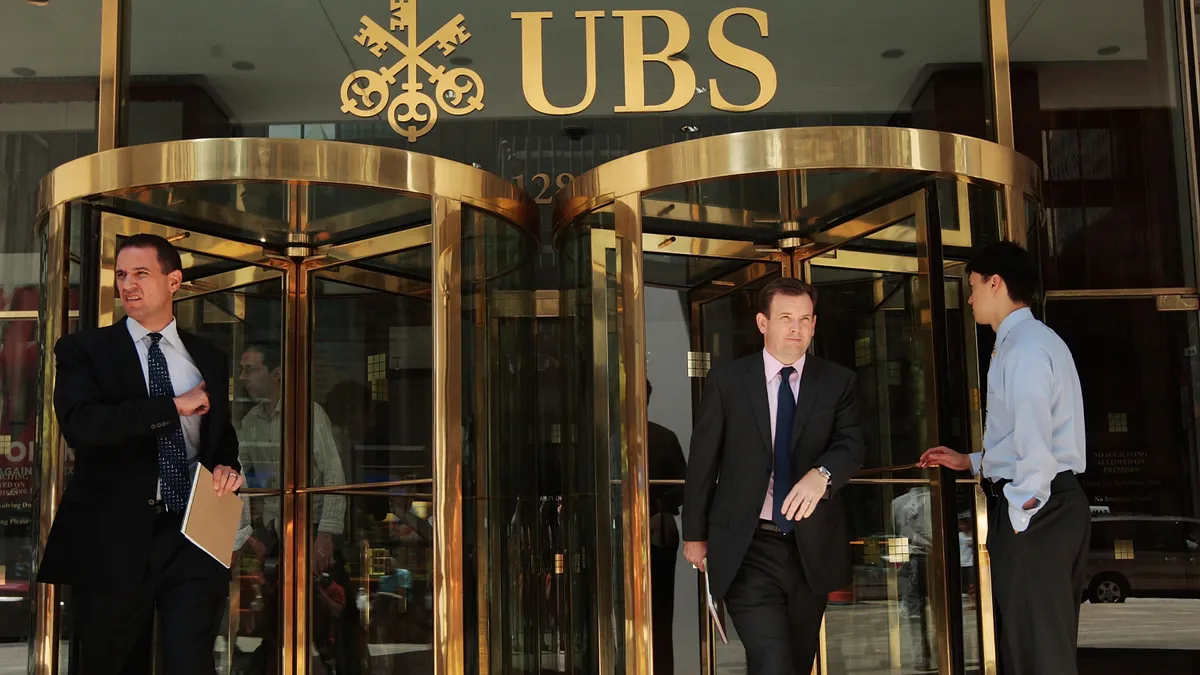Dive Brief:
- UBS has agreed to buy Credit Suisse for roughly $3.25 billion in an all-share, government-orchestrated deal, the banks said Sunday.
- The Swiss National Bank is extending $107 billion (100 billion Swiss francs) in liquidity assistance to UBS while the government is providing a $9.7 billion guarantee for the potential losses from assets that UBS will take over.
- The deal is expected to be complete by the end of the year, if possible, Credit Suisse said in a statement.
Dive Insight:
The transaction, combining Switzerland’s largest and second-largest lenders, was hastily formulated over the weekend to contain the crisis of confidence that had begun to send the global financial market into a frenzy following the collapse of smaller U.S. banks.
“It was indispensable that we acted quickly and find a solution as quickly as possible,” given that Credit Suisse is a systemically important bank, Swiss National Bank President Thomas Jordan said at a press conference late Sunday.
UBS Chair Colm Kelleher said he will slim down Credit Suisse’s investment banking arm, a unit that has been responsible for losses in recent times, likely bringing an end to the CS First Boston spinoff, Bloomberg reported.
“Let me be very specific on this: UBS intends to downsize Credit Suisse’s investment banking business and align it with our conservative risk culture,” Kelleher said at a press conference announcing the deal.
He also said that it was too early to talk about how many jobs may be cut after the deal, but the lender said the number will be significant. Credit Suisse was already midstream on a plan to cut 9,000 jobs in a restructuring it launched in October.
Kelleher said the government’s loss guarantee was required because there was not enough time for due diligence, and UBS plans to wind down some hard-to-value assets that the beleaguered bank has on its books. If these bring in losses, UBS will assume the first 5 billion francs and the federal government will shoulder the next 9 billion francs.
Credit Suisse’s management will hold their respective positions until the deal closes, Swiss regulator Finma said. After that, Kelleher and UBS CEO Ralph Hamers will retain their roles in the combined entity, Bloomberg reported.
Hamers asked his staff to still consider Credit Suisse as their rival, in UBS’s internal memo.
“Please remember that, until this deal closes, Credit Suisse is still our competitor and we cannot discuss business matters with their employees or take any action that could be interpreted as a step toward the merging of business,” Hamers wrote.
In its internal memo, Credit Suisse assured staff there would be no changes in payroll arrangements, and that bonuses would be paid March 24, according to Bloomberg. Credit Suisse told its employees that it will work to identify roles affected by consolidation but “will aim to continue to provide severance in line with market practice.”
As part of the deal, about 16 billion francs of Credit Suisse bonds, known as AT1s, will become worthless to ensure private investors help bear the costs, Finma said.
The $3.25 billion price on the deal was hardly UBS’s first bid. The bank’s initial offer came in at $1 billion, according to The Guardian. But Credit Suisse board members rejected it.
Hamers said UBS plans to bring down the combined company’s annual cost base by more than $8 billion by 2027 — $6 billion from staff reductions, and $2 billion from IT spending.
Credit Suisse has been embroiled in a chain of scandals, leadership changes and legal issues — the latest being a suit from U.S. investors over what they claim is a misleading 2021 report.
The embattled bank saw the biggest one-day selloff in its history Wednesday, when shares dropped as much as 30% after Saudi National Bank, its biggest shareholder, refused to increase its stake in Credit Suisse.
A $54 billion loan from Swiss National Bank last week could not halt the downfall of the lender. UBS had initially said it was not interested in acquiring its rival, saying it preferred to focus on its own stand-alone strategy centering on wealth than take on risks associated with Credit Suisse.
Credit Suisse’s share price has fallen 99% from its 2007 peak, according to Bloomberg.














